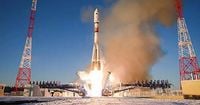A controversial Russian satellite that U.S. officials suspect is linked to nuclear anti-satellite weapons appears to be ‘spinning uncontrollably’. It’s thought Cosmos 2553, which Russia launched into space shortly before the country invaded Ukraine in 2022, is no longer functioning. Believed to be a radar satellite for Russian intelligence as well as a radiation testing platform, Cosmos 2553 last year became the centre of U.S. allegations that Russia has been developing a nuclear weapon capable of destroying entire satellite networks. This would include Elon Musk’s Starlink internet system used by Ukraine during the war. Vladimir Putin, however, rejected the accusations and claimed the satellite was for research purposes.
The satellite has had various bouts of what appears to be errant spinning and tumbling over the past year, according to Doppler radar data from space-tracking firm LeoLabs and optical data from Slingshot Aerospace. ‘This observation strongly suggests the satellite is no longer operational,’ the Centre for Strategic and International Studies, a Washington-based think tank, said in its annual Space Threat Assessment.
U.S. Space Command, which tracks objects in space and has condemned Russian military satellites in the past, said it was aware of a change in Cosmos 2553’s altitude but declined to provide further assessment on its current state. U.S. officials suspect that while the satellite itself is not a weapon, it is being used to aid Russia’s development of a nuclear anti-satellite weapon. Slingshot, whose global telescope network has been tracking the spacecraft since its February 5, 2022, launch, detected movements in May 2024.
‘Slingshot noted that the object’s brightness became variable, indicating a potential tumble,’ a company spokesperson said. But according to Slingshot’s latest observations, Cosmos 2553 appears to have stabilised, according to Belinda Marchand, the company’s chief science officer. Russia, a U.S. Space Command spokesperson said, has claimed Cosmos 2553’s mission is to test on-board instruments in a high-radiation environment, ‘but this does not align with its characteristics’. ‘This inconsistency, paired with a demonstrated willingness to target U.S. and allied on-orbit objects, increases the risk of misperception and escalation,’ the spokesperson said.
A Russian space satellite which has been linked to a dangerous nuclear weapons program is reportedly 'spinning uncontrollably' in orbit. Secretive Cosmos 2553, which was set off by Russia ahead of the Ukraine invasion in 2022, is thought now to be no longer operational. The tech is said to be strong enough to wipe out satellite networks including Elon Musk's Starlink internet system, which has helped Ukrainians in the war.
The latest concerns come after warnings from the U.S. that the equipment aims to aid the development of a nuclear anti-satellite weapon. However, Vladimir Putin rejected the claims and said that Cosmos 2553 was for research purposes. It is seen as a precursor to a weapon capable of a nuclear blast wiping out both military and civilian satellites supporting activities from financial transactions to weather forecasting. It could be deployed to Russia’s massive advantage in the event of a new world war breaking out.
The Russian defence ministry has refused to comment on the “stricken” satellite some 1,250 miles above Earth. It has been suffering errant spinning for around a year, say American analysts using Doppler radar data from space-tracking firm LeoLabs, and optical data from Slingshot Aerospace. The out-of-control satellite is reported to have a radar function for Russian military intelligence and to have radiation testing capabilities. While not itself a weapon, it is linked to Russia's development of a nuclear anti-satellite weapon.
Moscow has denied it is developing such a weapon and claimed Cosmos 2553 is for research purposes. LeoLabs earlier reported that the satellite was showing errant movements, and in December said there was “high confidence” it was tumbling due to additional data. “This observation strongly suggests the satellite is no longer operational,” according to the Centre for Strategic and International Studies, a Washington-based think tank, referring to the LeoLabs analysis in its annual Space Threat Assessment.
“Slingshot noted that the object's brightness became variable, indicating a potential tumble,” said a spokesman. Yet there were also suggestions that the satellite’s orbit had “stabilised”. One theory is that Cosmos 2553’s role is to test components of a weapon that will carry a nuclear device. It is feared to be equipped with “onboard instruments and systems under development for their testing under conditions of exposure to radiation and heavy charged particles.” Russia placed the satellite into orbit with a blast off from a Soyuz-2 rocket in February 2022, just days before Putin invaded Ukraine.
According to Reuters, the satellite, Kosmos 2553, which the U.S. military links to Russia’s nuclear anti-satellite program, has started spinning uncontrollably, likely signaling it’s no longer working. Russia launched the satellite a few weeks before invading Ukraine in 2022. It had already shown signs of uncontrolled rotation earlier in 2024. Kosmos 2553 is believed to have carried out radar reconnaissance and radiation testing.
While the satellite itself isn’t a weapon, the United States military says experiments conducted on it are helping Russia develop nuclear anti-satellite capabilities. The satellite orbits about 2,000km above Earth in a relatively isolated area. Most communication and surveillance satellites avoid this altitude because of strong cosmic radiation "hot spots." In November 2024, LeoLabs, a satellite tracking company using ground-based radar, detected the satellite making random movements. By December, LeoLabs raised its assessment to “high confidence” that the satellite was out of control.
U.S. Space Command is aware of a change in Cosmos 2553's altitude, according to Reuters. However, according to the latest observations of Slingshot, whose global telescope network has been tracking the spacecraft since its launch in 2022, Cosmos 2553 appears to have stabilized. Russian officials have claimed that the Cosmos-2553 is "intended for scientific research," which the U.S. officials say is unlikely. The Kremlin has earlier denied any intention to put nuclear weapons in space.




